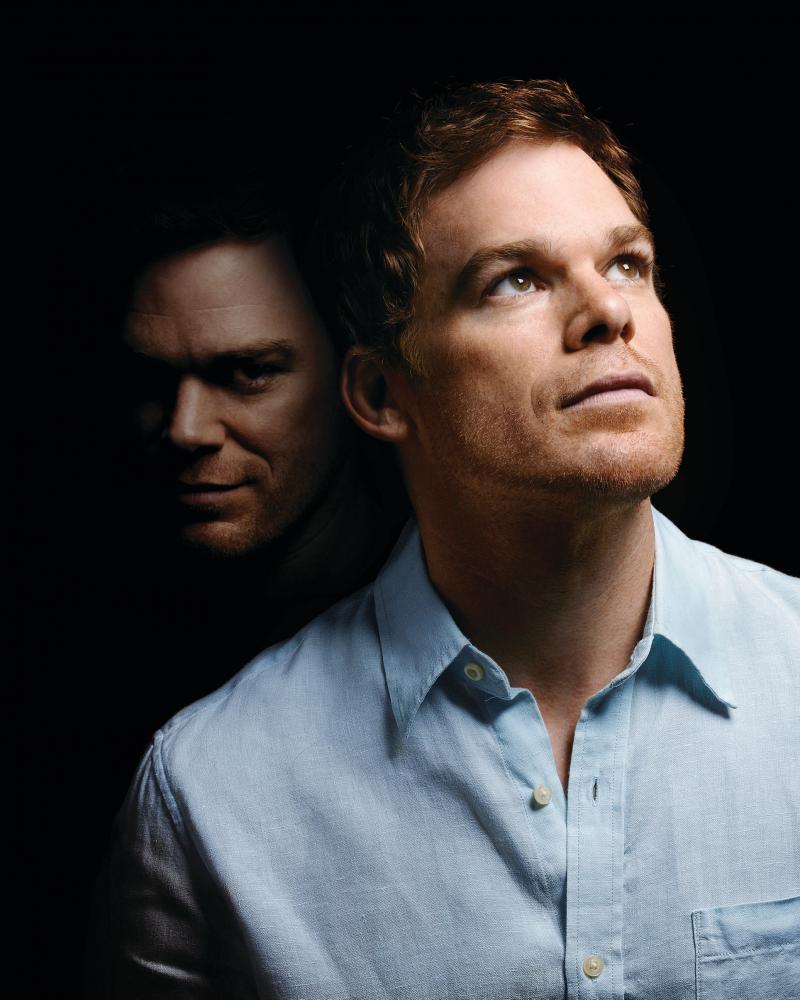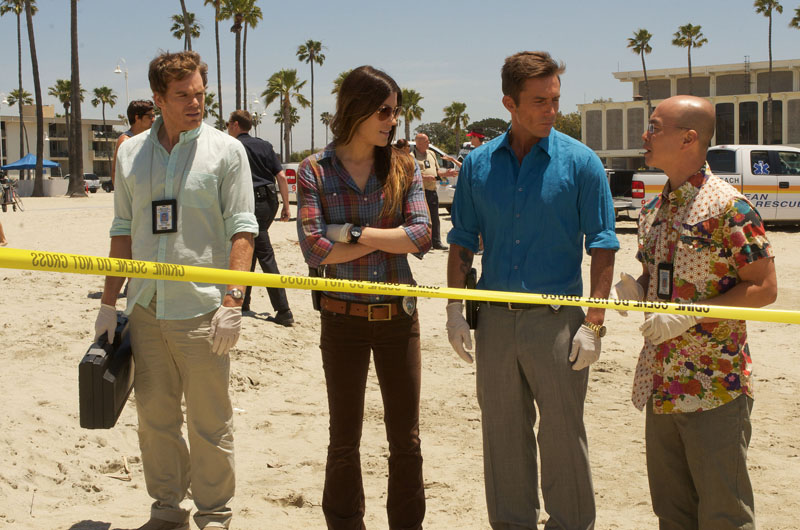Dexter, Series 6, FX | reviews, news & interviews
Dexter, Series 6, FX
Dexter, Series 6, FX
The vigilante drama returns with religious zeal but fatally clunky writing

Now on its third showrunner and entering its sixth season, it’s perhaps not a surprise that this once pitch-black drama, centring on a disturbed forensic analyst who moonlights as a vigilante serial killer, has lost its edge. The latest episode begins on a promisingly perilous note as Dexter (Michael C Hall) staggers through an abandoned lot having been stabbed, but there’s a characteristically punch-pulling reveal in the offing.
Where last season’s premiere had a head start in terms of drama, picking up just moments after the shock reveal of Dexter’s wife’s murder, there’s no such instant hook this time around. The most recent finale saw Dexter abandoned by newfound kindred spirit Lumen (Julia Stiles), whose dark impulses turned out to be more short-lived than his own, but several months have elapsed between seasons. Rather than Aftermath, the buzzword for this year, it seems, is Religion.
In theory, this just might work. There’s always been a dim element of the vengeful god about Dexter as a character, dispensing violent (if not quite biblical) justice to those who have escaped punishment for their sins. But the clunkily written discussions of religion in this episode don’t bode well. First, there’s Dexter’s exchange with an overly judgmental nun working at the school into which he hopes to enrol his son, during which he admits, “I don’t believe in anything.” Later, there’s an odd scene with his spiky adoptive sister Deb (Jennifer Carpenter), in which she seems to berate him for his lack of belief. Setting aside the idea that these two siblings – whose close bond has been well established and remains the show’s most interesting dynamic – have never discussed religion before, it’s just plain out of character for the boundlessly irreverent Deb to take the position she does.
 The religious theme dovetails conveniently into what will presumably become the season-long villain plotline, wherein Colin Hanks (Mad Men) and Edward James Olmos (Battlestar Galactica) play two very, very creepy blokes who do some very, very creepy things in the name of the Book of Revelation. And fair play to them – their replacement of a murdered man’s intestines with snakes is one of the show’s most impressively grim moments to date.
The religious theme dovetails conveniently into what will presumably become the season-long villain plotline, wherein Colin Hanks (Mad Men) and Edward James Olmos (Battlestar Galactica) play two very, very creepy blokes who do some very, very creepy things in the name of the Book of Revelation. And fair play to them – their replacement of a murdered man’s intestines with snakes is one of the show’s most impressively grim moments to date.
This is also a very funny episode, thanks to the A plot which sees Dexter attend his high-school reunion in order to exact justice on a murderous fellow student. Hall is very good with fish-out-of-water comedy and the initial reunion scenes take full advantage, between his bemused reaction to his co-attendees’ dancing (“I have no idea what Hammer Time is. Or how it differs from regular time.”) and his awkward shuffling attempt to join in.
One of Dexter’s biggest problems has always been its cast of supporting characters, who vary from less-than-compelling to so-dull-I-may-chew-my-own-arm-off. The writers have never seemed to know whether they are making an ensemble or a character study – presumably, the answer is that they’d like to make a character study, but in order to avoid overworking Hall they try to have it both ways. But it’s clear that their real interest is their protagonist, and so with the exception of Carpenter’s Deb the supporting players are cardboard cut-outs, wheeled on sporadically between Hall’s scenes to stem the gaps without ever making you care.
 Fortunately in this episode we’re spared too much of Captain LaGuerta (Lauren Vélez), a serial offender in this regard, but her interminable marriage plotline with Angel (David Zayas) has been replaced by a subplot involving his scantily clad younger sister, who’s begun working as a part-time babysitter for single dad Dexter. On the basis of previous seasons, you just know that you’re going to be spending vastly more time with these characters than you’d like. One can argue that the show is called Dexter and such an imbalance is par for the course. But numerous such shows from House to Buffy have developed compelling supporting casts, who can sustain their own plotlines without compromising focus on the lead.
Fortunately in this episode we’re spared too much of Captain LaGuerta (Lauren Vélez), a serial offender in this regard, but her interminable marriage plotline with Angel (David Zayas) has been replaced by a subplot involving his scantily clad younger sister, who’s begun working as a part-time babysitter for single dad Dexter. On the basis of previous seasons, you just know that you’re going to be spending vastly more time with these characters than you’d like. One can argue that the show is called Dexter and such an imbalance is par for the course. But numerous such shows from House to Buffy have developed compelling supporting casts, who can sustain their own plotlines without compromising focus on the lead.
With a consistently first-rate leading man like Hall at the helm, there is no good reason Dexter should fail to be one of the best things on television. But thanks to its increasingly lazy character writing and reluctance to really mime its premise’s vast potential for bleak, black drama, it remains a show that was great only in its first season. If you’re looking for a truly smart, truly dark series about a compelling character wrestling with his capacity for morally motivated evil, look no further than Breaking Bad.
Buy
Share this article
The future of Arts Journalism
You can stop theartsdesk.com closing!
We urgently need financing to survive. Our fundraising drive has thus far raised £49,000 but we need to reach £100,000 or we will be forced to close. Please contribute here: https://gofund.me/c3f6033d
And if you can forward this information to anyone who might assist, we’d be grateful.

Subscribe to theartsdesk.com
Thank you for continuing to read our work on theartsdesk.com. For unlimited access to every article in its entirety, including our archive of more than 15,000 pieces, we're asking for £5 per month or £40 per year. We feel it's a very good deal, and hope you do too.
To take a subscription now simply click here.
And if you're looking for that extra gift for a friend or family member, why not treat them to a theartsdesk.com gift subscription?
more TV
 Slow Horses, Series 5, Apple TV+ review - terror, trauma and impeccable comic timing
Jackson Lamb's band of MI5 misfits continues to fascinate and amuse
Slow Horses, Series 5, Apple TV+ review - terror, trauma and impeccable comic timing
Jackson Lamb's band of MI5 misfits continues to fascinate and amuse
 Coldwater, ITV1 review - horror and black comedy in the Highlands
Superb cast lights up David Ireland's cunning thriller
Coldwater, ITV1 review - horror and black comedy in the Highlands
Superb cast lights up David Ireland's cunning thriller
 Blu-ray: The Sweeney - Series One
Influential and entertaining 1970s police drama, handsomely restored
Blu-ray: The Sweeney - Series One
Influential and entertaining 1970s police drama, handsomely restored
 I Fought the Law, ITVX review - how an 800-year-old law was challenged and changed
Sheridan Smith's raw performance dominates ITV's new docudrama about injustice
I Fought the Law, ITVX review - how an 800-year-old law was challenged and changed
Sheridan Smith's raw performance dominates ITV's new docudrama about injustice
 The Paper, Sky Max review - a spinoff of the US Office worth waiting 20 years for
Perfectly judged recycling of the original's key elements, with a star turn at its heart
The Paper, Sky Max review - a spinoff of the US Office worth waiting 20 years for
Perfectly judged recycling of the original's key elements, with a star turn at its heart
 The Guest, BBC One review - be careful what you wish for
A terrific Eve Myles stars in addictive Welsh mystery
The Guest, BBC One review - be careful what you wish for
A terrific Eve Myles stars in addictive Welsh mystery
 theartsdesk Q&A: Suranne Jones on 'Hostage', power pants and politics
The star and producer talks about taking on the role of Prime Minister, wearing high heels and living in the public eye
theartsdesk Q&A: Suranne Jones on 'Hostage', power pants and politics
The star and producer talks about taking on the role of Prime Minister, wearing high heels and living in the public eye
 King & Conqueror, BBC One review - not many kicks in 1066
Turgid medieval drama leaves viewers in the dark
King & Conqueror, BBC One review - not many kicks in 1066
Turgid medieval drama leaves viewers in the dark
 Hostage, Netflix review - entente not-too-cordiale
Suranne Jones and Julie Delpy cross swords in confused political drama
Hostage, Netflix review - entente not-too-cordiale
Suranne Jones and Julie Delpy cross swords in confused political drama
 In Flight, Channel 4 review - drugs, thugs and Bulgarian gangsters
Katherine Kelly's flight attendant is battling a sea of troubles
In Flight, Channel 4 review - drugs, thugs and Bulgarian gangsters
Katherine Kelly's flight attendant is battling a sea of troubles
 Alien: Earth, Disney+ review - was this interstellar journey really necessary?
Noah Hawley's lavish sci-fi series brings Ridley Scott's monster back home
Alien: Earth, Disney+ review - was this interstellar journey really necessary?
Noah Hawley's lavish sci-fi series brings Ridley Scott's monster back home
 The Count of Monte Cristo, U&Drama review - silly telly for the silly season
Umpteenth incarnation of the Alexandre Dumas novel is no better than it should be
The Count of Monte Cristo, U&Drama review - silly telly for the silly season
Umpteenth incarnation of the Alexandre Dumas novel is no better than it should be

Add comment